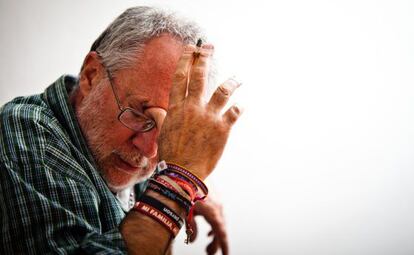“A state that doesn’t know where 30,000 of its citizens are is unworthy of the name”
Poet Javier Sicilia founded a victims' movement after his son was murdered


It’s Good Friday, and Cuernavaca (in the Mexican state of Morelos) is teeming with tourists. Javier Sicilia’s home lies some distance away from the Zócalo, the noisy central square. It is a small, austere-looking, somewhat untidy apartment that he shares with his second wife. The bare white walls seem to direct the visitor’s gaze toward a small shelf bearing candles and several photographs of a young man. It is the poet’s son, brutally murdered two years ago now by drug traffickers along with six of his friends.
Sitting at a wooden dining table as he chain smokes Delicados cigarettes, Sicilia revisits the before and the after of the day that changed his life forever, and about how he unwillingly became the voice of Mexico’s victims and one of the country’s most relevant social actors.
The voice of the victims wears an Indiana Jones hat and a vest with pockets. He admits it was “the first thing I found in the closet” when he embarked on that first march from Cuernavaca to Distrito Federal, nine days after the death of his son Juanelo, and uttered his famous “estamos hasta la madre” (We have had it up to here). Later, his clothing became a symbol, like just about everything else. Just like the film character, who became famous running around the globe in search of the Holy Grail or the Crystal Skull, the poet has been tirelessly fighting since that “horrendous” day for recognition and dignity for the thousands of victims that this country can barely put a number on. There have been over 60,000 deaths since former president Felipe Calderón began the war on organized crime seven years ago.
The conversation inside the poet’s house is interrupted up to three times by a call from the Morelos state attorney, to whom he had complained a day earlier because the vehicle in which he travels with two bodyguards left them stranded in the middle of the road.
“It’s not the narcs who are going to kill me, it’s the attorney’s office. If this is the way they take care of a citizen they presumably want to protect, what can the regular Joes expect?” he laughs as he hangs up the phone.
The government awarded Sicilia protection two years ago, when he became the visible head of a movement called Movimiento por la Paz, con Justicia y Dignidad, which has organized the largest demonstrations in memory in Mexico City, as well as marches up and down Mexico and a “peace caravan” in the United States demanding justice and an end to the US-backed war against drugs.
“When I accepted the bodyguards I told them to show me their weapons. I asked what would happen if we were ambushed, and they said that with these weapons we’d be blown to pieces,” he laughs again. The laughter softens up but never quite eliminates the permanent sadness in his eyes.
“I can understand joy, but I’m no longer fully here. I bring something of death with me.”
Question. Last September you announced that you were taking a step back to stop being the visible face of Movimiento. Why?
Answer. The time had come to make it more horizontal. I think it was too focused on my person. Besides, I’m not the type to seek too much consensus – I think of something and I do it, and that was hurting the movement, too. Besides, I was very tired, and I needed to spend time with my daughter and my grandson, and with my loneliness, to recover from my broken certainties, to try to return to the world and get my life back.
Q. Was the exhaustion worth it?
A. Yes. These types of deaths have to have some kind of meaning. This weariness, which does not make up for the death of a son, can bring some sense and meaning to what might have been only pain, death and contempt, like all the other deaths in this country up until the death of my son.
Q. Was there any trouble within the organization?
A. (Laughter) I did not attempt to create a movement, I am not an organizer, I am not a political leader; I’m a man who heeded the calling of his heart. There was a lot of opposition to the dialogue [with politicians and the government]. The hardcore left were very reluctant. They told me that if I was an anarchist, then how come I wanted dialogue. But I always viewed the movement as a victim’s body with two legs: mobilizations and dialogue. Otherwise, who will take responsibility for the victims? It is not our role and we lack the capacity; we cannot replace the state. I said: “Whether you like it or not, we are heading for dialogue.”
Q. You’ve had two years in the limelight. Have you been able to mourn?
A. Meeting others and sharing the pain is a part of mourning. It was simply a very extensive kind of mourning across the country; it was the mourning of many other victims, too. Then came my sojourn in France [in late 2012], which allowed me to be alone with myself, with my daughter and with my grandson. But this type of mourning, the death of a son, never ends. It will always be there like an enormous pain, like an unnatural reality. The death of a son, even more so in the conditions in which I lost my son, shakes up all the certainties and all the paradigms that you’ve built during your entire life.
Q. Months before the elections, you said that President Enrique Peña Nieto was the worst candidate. Do you still think that way or do you go back on your opinion?
A. I don’t know, but he’s the only president we’ve got. I didn’t vote, and I asked for blank votes, but people elected this candidate. We need to try to work with him to move this country forward. He’s had a good attitude, he’s enacted the Victims Law, he has accepted the state’s indebtdedness to the victims which Felipe Calderón refused to accept. This is progress. When I said he was the worst candidate it was because a return of the PRI is not the best thing that could have happened to us. But let’s give him a chance.
Q. Did he seem sincere in your meetings with him?
A. I think he is tremendously pragmatic, and that’s scary. He is an insecure man but he has one virtue: he knows how to listen and he has surrounded himself with intelligent people who can make up for his insecurity. For now he has given us good signs, but this country’s tragedy is very great. We need to keep up the pressure, so that promises are kept and the war strategy is radically changed for a road to peace.
Q. Do you nurture any feelings of resentment toward former President Calderón?
A. No, I feel a bit sorry for him. A man can refuse to accept his responsibility, but there is some part of his conscience, especially for a man who grew up a Catholic like himself, that cannot be at peace. I told him at a meeting that the responsibility for the 40,000 deaths, including that of my son, lay at his feet. I hope he is able to accept it humbly and to heal his heart. It is something that he will have to face, and I don’t wish that on anybody.
Q. Have you felt attacked because of your excessive prominence?
A. Very much so. When one becomes visible, there is always room for interpretation and suspicion. In this corrupt country nobody can understand that anybody else would act freely, out of love.
Q. What can the state do for a mother who has lost five children?
A. Not much, except look for them. It can find them dead or alive and return them to their mother so she can either see them alive or start mourning. For as long as they fail to show up, either dead or alive, it is a state crime to keep a mother this way. A father doesn’t give a damn whether there are 20 people arrested, he just wants to know where his son is. A state that is unable to know where 30,000 of its citizens are is a state unworthy of that name.
Q. What are your hopes for the future?
A. I hope we can be at peace again. It is a very long process, because first we need to find the 30,000 ‘disappeared.’ Then we need to find that road to peace and I see a very big problem there with the reconciliation process. Whether we like it or not, those boys who are being corrupted by organized crime were not criminals, there was a state responsibility in it, since the state abandoned them and turned them into fodder for crime. We’re going to have to forgive them, and the process is going to be a lot more painful. There is a corruption that is the result of economic misery.
Q. Do you wake up some mornings wondering why you got involved in all this?
A. Every morning I wonder why another day dawned... But somebody had to do it out of respect for those lives that should not have ended.
Tu suscripción se está usando en otro dispositivo
¿Quieres añadir otro usuario a tu suscripción?
Si continúas leyendo en este dispositivo, no se podrá leer en el otro.
FlechaTu suscripción se está usando en otro dispositivo y solo puedes acceder a EL PAÍS desde un dispositivo a la vez.
Si quieres compartir tu cuenta, cambia tu suscripción a la modalidad Premium, así podrás añadir otro usuario. Cada uno accederá con su propia cuenta de email, lo que os permitirá personalizar vuestra experiencia en EL PAÍS.
¿Tienes una suscripción de empresa? Accede aquí para contratar más cuentas.
En el caso de no saber quién está usando tu cuenta, te recomendamos cambiar tu contraseña aquí.
Si decides continuar compartiendo tu cuenta, este mensaje se mostrará en tu dispositivo y en el de la otra persona que está usando tu cuenta de forma indefinida, afectando a tu experiencia de lectura. Puedes consultar aquí los términos y condiciones de la suscripción digital.








































